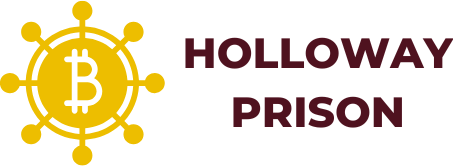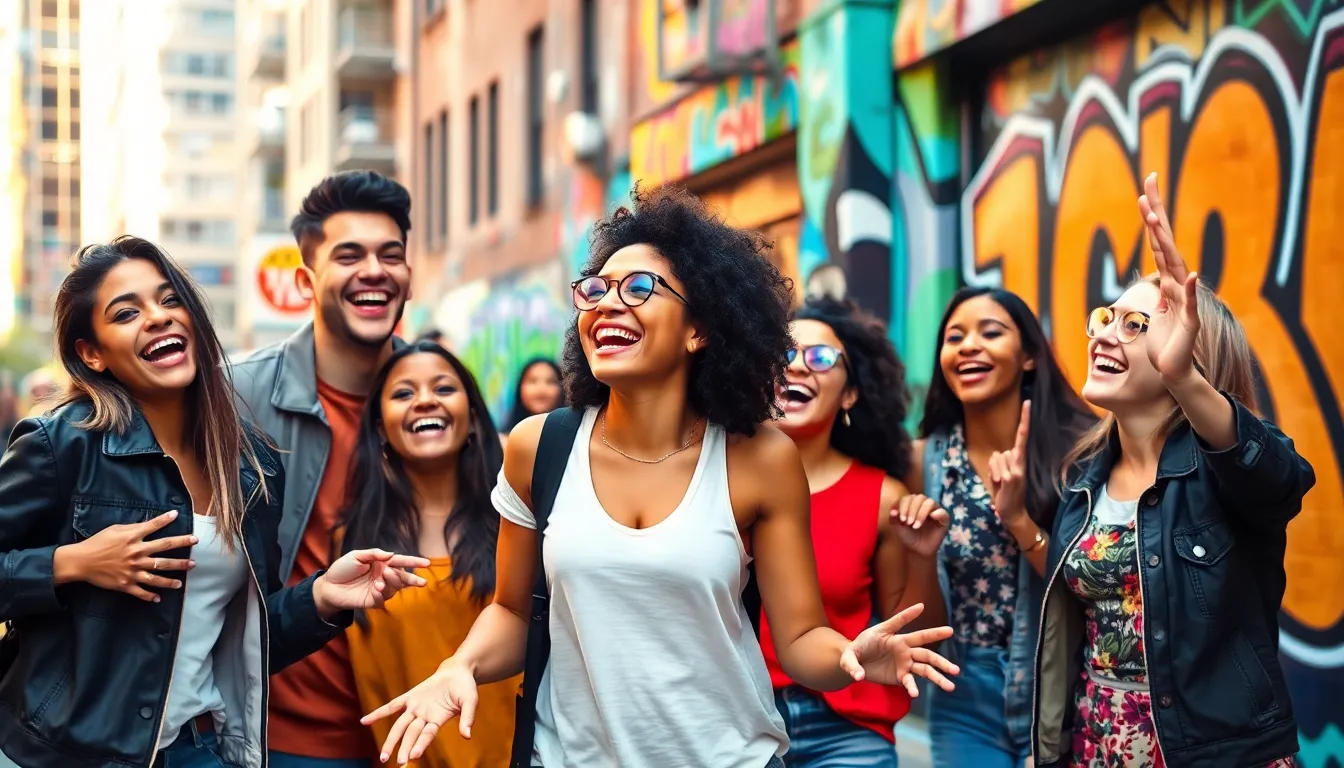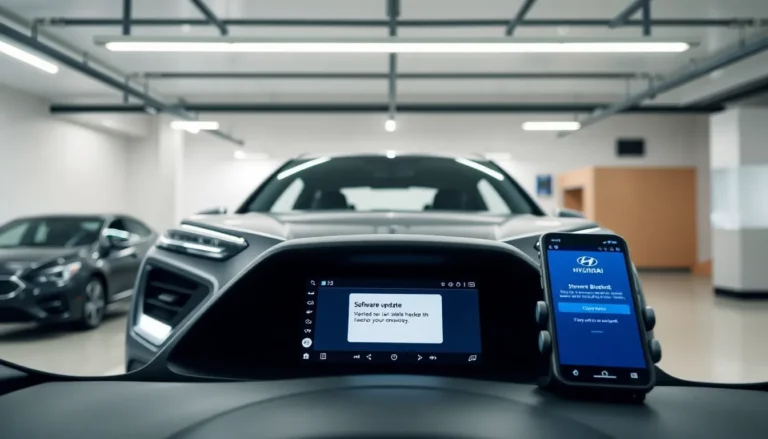In a world where memes reign supreme and cat videos are considered high art, internet culture has woven itself into the very fabric of daily life. It’s not just a collection of quirky trends; it’s a vibrant tapestry of creativity, humor, and sometimes downright absurdity. From viral challenges to the latest TikTok dances, this digital playground shapes how people connect and communicate.
Table of Contents
ToggleOverview of Internet Culture
Internet culture permeates daily life, shaping interactions and communication styles. This unique blend of creativity, humor, and absurdity manifests through various digital platforms. Memes, for instance, serve as a shorthand for complex ideas, making communication more relatable and engaging. Viral challenges, such as the Ice Bucket Challenge or the Mannequin Challenge, foster community participation and encourage creativity among users.
TikTok dances exemplify how trends can quickly spread across demographics, uniting individuals through shared experiences. Online communities form around niche interests, providing platforms for discussion and collaboration. Social media, particularly platforms like Twitter, Instagram, and Reddit, play a significant role in amplifying diverse voices and perspectives.
User-generated content drives much of the internet culture, with individuals creating and sharing videos, artwork, and writing that challenge traditional media narratives. The rapid evolution of technology influences this cultural landscape. Streaming services redefine entertainment consumption patterns, while gaming communities foster social interactions among players.
Digital platforms enable activism and social change by raising awareness of critical issues. Hashtags like #BlackLivesMatter and #MeToo demonstrate the power of online movements in mobilizing support and dialogue. As internet culture continues to evolve, its influence on real-world behaviors and attitudes grows more pronounced.
This contemporary culture reflects a dynamic interplay between technology and human interaction. Engaging with internet culture encourages creativity, collaboration, and connectivity among users worldwide. Every meme, challenge, or trend contributes to a rich tapestry that defines how people communicate and relate to one another today.
Evolution of Internet Culture

Internet culture has undergone significant changes since its inception. The transformation reflects technological advancements and shifts in user engagement.
Early Days of the Internet
In the early days of the internet, forums and chat rooms served as primary communication platforms. Users engaged in text-based discussions on topics like technology and hobbies. Sites like Geocities and AOL Instant Messenger popularized personal expression and connectivity. Early memes, often simple images with humorous captions, emerged in this era, laying groundwork for future internet phenomena. These early instances began shaping the informal tone that defines internet dialogue today.
The Rise of Social Media
Social media platforms revolutionized how people interact online. Facebook, Twitter, and later Instagram, connected users across the globe, fostering real-time communication. These platforms empowered individuals to share personal experiences and opinions with large audiences. User-generated content gained traction as bloggers and influencers emerged, transforming content consumption. Viral trends, including memes, challenges, and hashtags, spread quickly, reinforcing community engagement. As social media evolved, it became a central hub for social activism, operations, and cultural movements.
Impact of Internet Culture
Internet culture significantly influences various aspects of daily life, especially communication and entertainment.
Influence on Communication
Communication styles adapt rapidly due to internet culture. Memes serve as visual shorthand, conveying complex ideas quickly. People increasingly rely on GIFs and emojis to express emotions, enhancing relatability. Online platforms create informal dialogues, where humor and absurdity thrive. Viral trends encourage participation and creativity, making conversations more engaging. Additionally, connectivity among diverse communities fosters a shared language that transcends geographical boundaries. Social media acts as a space for activism, amplifying voices during movements like #MeToo. Overall, communication continues to evolve, deeply shaped by digital interactions and the immediacy of the internet.
Changes in Entertainment
Entertainment consumption transforms with the rise of internet culture. Streaming platforms challenge traditional media, offering on-demand access to diverse content. Short-form videos dominate viewing habits, with TikTok leading the trend in bite-sized entertainment. Creators on these platforms innovate consistently, bringing fresh content that resonates with audiences. User-generated content thrives, encouraging individuality while democratizing fame. Collaborative online experiences, such as creator streams and virtual events, foster community engagement. As a result, entertainment shifts from passive consumption to active participation, showcasing the evolving landscape shaped by internet culture.
Internet Subcultures
Internet subcultures shape the vibrant landscape of online interactions and creativity. These communities thrive on shared interests and unique expressions.
Memes and Trends
Memes serve as cultural touchstones, encapsulating humor and commentary on current events. They evolve rapidly, reflecting real-time societal changes. Trends arise organically, often originating from user-generated content and viral moments. Popular examples include the “Distracted Boyfriend” meme and the Ice Bucket Challenge. Users create variations, making them relatable and engaging. The infectious nature of these memes fosters a sense of belonging, as audiences connect over shared experiences. With platforms like TikTok and Twitter, trends spread quickly, influencing communication styles across demographics. Memes and trends exemplify internet culture’s dynamic nature, allowing users to participate in global conversations.
Online Communities
Online communities unite individuals with niche interests, offering spaces for collaboration and support. Platforms like Reddit and Discord facilitate discussions around hobbies, fandoms, and social issues. Members share knowledge, enhance skills, and create lasting friendships. Each community develops unique languages, norms, and values that strengthen connections. For instance, fandom communities often generate fan art and fan fiction, showcasing creativity. Additionally, these groups can mobilize for social causes or support mental health awareness. The shared identity within online communities fosters inclusivity, allowing members to express themselves freely. Online communities exemplify the internet’s power to connect people beyond geographical boundaries.
Challenges within Internet Culture
Internet culture faces several significant challenges that impact user interactions and community dynamics.
Cyberbullying and Harassment
Cyberbullying poses a pressing issue within online communities. It manifests through negative comments, threats, or sharing private information without consent. Statistics reveal that 36% of students experienced cyberbullying at some point. Victims often feel isolated or anxious, adversely affecting their well-being. Platforms like Facebook and Instagram strive to implement measures to combat this issue, yet challenges persist in effectively monitoring abusive behavior. Notably, the anonymity provided by the internet can embolden harassers, making accountability difficult. Awareness campaigns educate users on recognizing and reporting cyberbullying behaviors to foster a safer online environment.
Misinformation and Fake News
Misinformation significantly influences internet culture, shaping perceptions and beliefs. Instances of fake news shared on platforms like Twitter can reach millions in minutes. Research indicates that false news spreads six times faster than true stories. This rapid dissemination can distort public understanding of critical events, such as health crises or elections. Technology companies face challenges in regulating content and verifying the accuracy of information. Users need to develop critical thinking skills to discern credible sources from misleading narratives. Fact-checking organizations play a vital role in combating misinformation, offering tools to help audiences navigate the complexities of online information.
Internet culture continues to evolve and shape the way people connect and communicate. Its blend of creativity and humor fosters a sense of community while offering unique avenues for self-expression. The rise of memes and viral trends not only reflects societal sentiments but also encourages active participation and collaboration among users.
Despite the challenges of misinformation and cyberbullying, the positive aspects of internet culture remain significant. It empowers individuals to voice their opinions and mobilize for social change. As technology advances, the impact of internet culture will only deepen, further transforming interactions and enriching the digital landscape. The journey of internet culture is far from over, and its influence will undoubtedly play a crucial role in shaping future communication and community dynamics.





